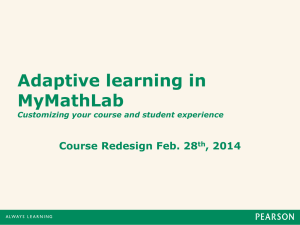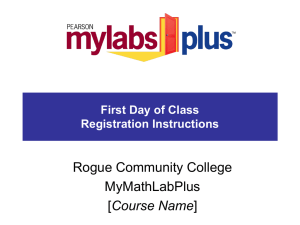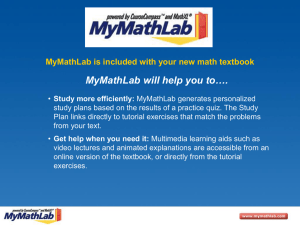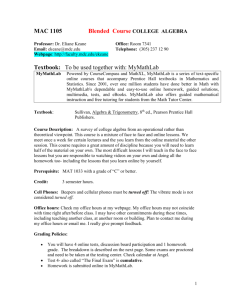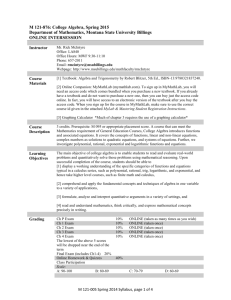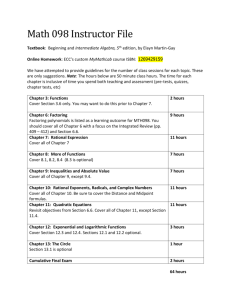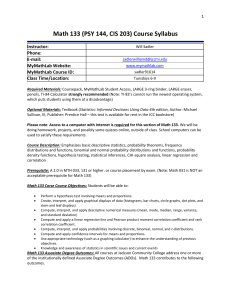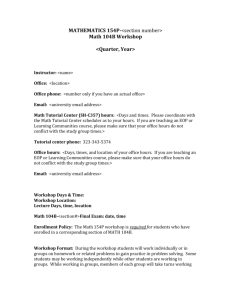A Course in the General Education Program
advertisement
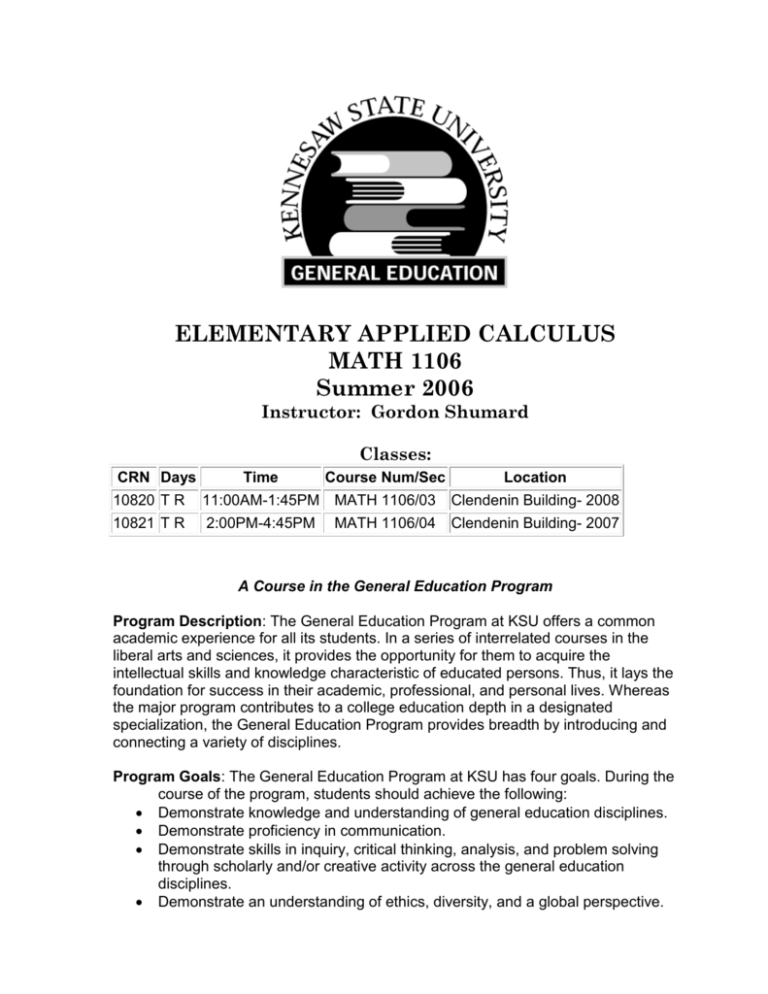
ELEMENTARY APPLIED CALCULUS MATH 1106 Summer 2006 Instructor: Gordon Shumard Classes: CRN Days Time Course Num/Sec Location 10820 T R 11:00AM-1:45PM MATH 1106/03 Clendenin Building- 2008 10821 T R 2:00PM-4:45PM Clendenin Building- 2007 MATH 1106/04 A Course in the General Education Program Program Description: The General Education Program at KSU offers a common academic experience for all its students. In a series of interrelated courses in the liberal arts and sciences, it provides the opportunity for them to acquire the intellectual skills and knowledge characteristic of educated persons. Thus, it lays the foundation for success in their academic, professional, and personal lives. Whereas the major program contributes to a college education depth in a designated specialization, the General Education Program provides breadth by introducing and connecting a variety of disciplines. Program Goals: The General Education Program at KSU has four goals. During the course of the program, students should achieve the following: Demonstrate knowledge and understanding of general education disciplines. Demonstrate proficiency in communication. Demonstrate skills in inquiry, critical thinking, analysis, and problem solving through scholarly and/or creative activity across the general education disciplines. Demonstrate an understanding of ethics, diversity, and a global perspective. Course Description: Math 1106 uses techniques of college algebra and elementary calculus to analyze and model real world phenomena. The emphasis will be on applications using an intuitive approach to the mathematics rather than formal development. Topics include graphs, derivatives, and integrals of functions. The course incorporates collaborative learning, oral and written reports, and technology. Textbook: Calculus and Its Applications, 8th Edition, Bittinger Additionally Required: MyMathLab student access code – should come free with new text (ISBN: 0321198042 includes text and MML access code) There is a fee for a student access code with a used text. A new text with access code may be cheaper. Note: There is no need to purchase the Student Solutions Manual or Graphing Calculator Manual as there are provided as part of MyMathLab. Registering for MyMathLab: In order to register for your section of MATH1106 in MyMathLab, you will need your student access code and a course ID. The course ID for your section of MATH1106 is: 1106 T TH 11:00 a.m. 1106 T TH 2:00 p.m. shumard47741 shumard52389 If you are accessing MyMathLab from a non-campus computer for the first time, you must run the Installation Wizard. A link to the installation wizard is shown on the first page when linking to MML. The Installation Wizard will install several plug-ins that must be linked to Internet Explorer so you can use MML to work homework problems and perform other functions. MyMathLab Web Site: http://www.mymathlab.com Instructor: Gordon Shumard Email: gshumard@kennesaw.edu Faculty Website: http://science.kennesaw.edu/~gshumard Office: Clendenin 3038 (Clendenin Building – 3rd Floor) Office Hours: Monday and Wednesday 1:30 p.m. to 3:15 p.m. Additional times scheduled by appointment. Email anytime. Prerequisite: Math 1101, Math 1113, or Math 1111. Attendance: Regular class attendance is essential and expected of every student enrolled in this class. In the event of any absence, students are responsible for all material, assignments, and announcements given in class. Homework: Assignments will be completed via MyMathLab, an Internet based learning platform that accompanies the Bittinger text. Homework will be assigned after the topic is covered in class. The MyMathLab homework assignment must be completed before the beginning of the next scheduled class. MyMathLab homework problems can be worked multiple times until a correct answer (green check) is recorded. . The homework is “Submitted” by clicking on the SUBMIT button. Assignments may be submitted as many times as you desire. The instructor will also submit “incomplete assignments” after the due date has passed. Homework points are derived from the average score compiled by MyMathLab. The grade for that assignment is recorded in the MyMathLab Gradebook. Individual problems within assignments can not be completed after the due date. However, for studying purposes homework problems may be accessed after the due date for practice via: Course Materials .… Gradebook .… Homework …. (Select Chapter) …. Review Homework Important: MyMathLab is accessible from all lab computers on the KSU campus. You may also access MyMathLab from your own computers after installing the required browser plugins via the Installation Wizard. Any computer difficulties you experience are your responsibility and not grounds for extensions of homework due dates. If you are having trouble with your computer, access one of the computers on campus and complete your homework. Class Preparation: Students are expected to spend 2.5 hours of quality study time between class sessions. This time should be divided among 4 activities: rereading the section of the book discussed the previous classroom session; working the recommended homework; reading the section of the textbook to be lectured on during the next class session; and preparing for tests. The schedule of tests appears in this syllabus. There will be no make-up tests, quizzes, or exams (see grading policy below). Please note that the final exam grade can replace the lowest test score including a missed test. Grading Policies: There will be three tests, a comprehensive final exam and a homework grade. The students will accumulate points during these graded activities as follows: Three tests worth 100 points each Homework (MyMathLab) Comprehensive final exam Total 300 points 100 points 100 points 500points No make-up quizzes, tests, or exams will be given. However, the final exam grade (scaled appropriately) will be substituted for the lowest test grade if this improves the student’s point count. Course grades will be assigned as follows: 450 - 500 points 400 – 449 points 350 - 399 points 300 - 349 points Below 300 points A B C D F Technology Statement: Technology in the form of a TI-83, TI-83 Plus, or TI-84 graphing calculator (or its equivalent) will be used throughout the course to enhance mathematical thinking and problem solving and to judge the reasonableness of results. Important Dates First day of class: June 1 Holiday: July 4 Test I: o June 15 Last day to withdraw without academic penalty : June 30 Test II : o June 29 Test III: o July 20 Last regular class meeting day: o July 25 Final exam schedule: o 11:00 a.m. class: Thursday, July 27, 11:30 a.m. to 1:30 p.m. o 2:00 p.m. class: Thursday, July 27, 2:00 p.m. to 4:00 p.m. Course Learning Outcomes: During this course, students will: 1. Develop and understanding of the mathematical relationship between revenue, variable cost, fixed cost and profit within the context of problem solving. 2. Understand the relationship between slope, average rate of change and the derivative. 3. Use derivatives to determine relative and absolute maximums and minimums. 4. Identify maximums and minimums of functions based upon the characteristics of the first and second derivatives. 5. Identify the location of and significance of vertical and horizontal asymptotes. 6. Understand the mathematical concepts related to elasticity of demand. 7. Compute the elasticity of demand using the derivative of the demand function. 8. Derive the indefinite and definite integral of a function. 9. Use the definite integral to compute the area between the graphs of two functions. 10. Understand the mathematical concepts related to Consumers Surplus and Producers Surplus. 11. Compute the Consumers Surplus and Producers Surplus using the definite integral. Calculator: TI-83, TI-83+, or TI-84 WITHDRAWAL FROM THE UNIVERSITY OR FROM INDIVIDUAL COURSES AND ACADEMIC INTEGRITY Summer Semester 2006 Withdrawal NEW WITHDRAWAL POLICY EFFECTIVE FALL 2004 Students may withdraw from one or more courses anytime before the last three weeks of the semester. However, as of fall 2004, students will be allowed a maximum of eight total withdrawals if they enter KSU as a freshman. Transfer students will be allowed one withdrawal per fifteen credit hours attempted, for a maximum of eight. Students who choose to pursue a second degree at KSU will be allowed two additional withdrawals. Students who entered KSU before the fall of 2004 will be allowed one withdrawal per fifteen credit hours attempted for a maximum of eight. To withdraw the student should complete an official withdrawal form in the Office of the Registrar. Students who officially withdraw from courses on or before the last day to withdraw without academic penalty will receive a "W". Students who officially withdraw after the last day to withdraw without academic penalty (and before the last three weeks of the semester) will receive a "WF", which will be counted as an "F" in calculation of their grade point average. The only exceptions to these withdrawal regulations will be for instances involving unusual circumstances, which are fully documented. Students may appeal to the academic standing committee for consideration of unusual circumstances. Exact withdrawal dates will be published in the official academic calendar. Students who simply stop attending classes without officially withdrawing usually are assigned failing grades. Academic Integrity Every KSU student is responsible for upholding the provisions of the Student Code of Conduct, as published in the Undergraduate and Graduate Catalogs. Section II of the Student Code of Conduct addresses the University's policy on academic honesty, including provisions regarding plagiarism and cheating, unauthorized access to University materials, misrepresentation/falsification of University records or academic work, malicious removal, retention, or destruction of library materials, malicious/intentional misuse of computer facilities and/or services, and misuse of student identification cards. Incidents of alleged academic misconduct will be handled through the established procedures of the University Judiciary Program, which includes either an "informal" resolution by a faculty member, resulting in a grade adjustment, or a formal hearing procedure, which may subject a student to the Code of Conduct's minimal one semester suspension requirement.
